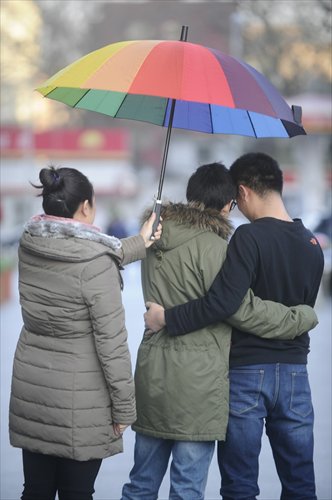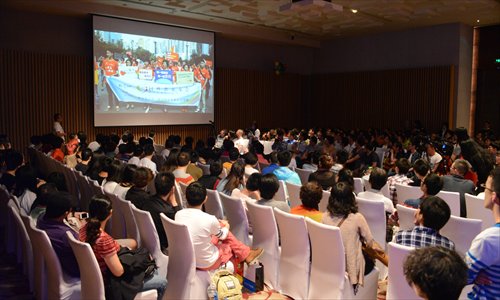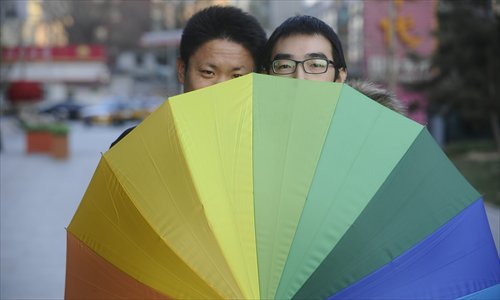Unconditional love
Chinese parents are learning to accept their gay children

By informing themselves about homosexuality, open-minded parents are challenging traditional objections to their children being gay. Photo: Li Hao/GT
In a daze, Wu Houjun (pseudonym),switched off his computer and stumbled into his bedroom, unable to come to terms with what he had just discovered.
His son, it seemed, was gay.
Wu crawled into bed. Then, unable to hold it in any longer, he wept. While perusing the family iPad two days earlier, some group chat boxes that his 15-year-old son had left open had caught his eye. The people his son was chatting with were not his classmates or friends that Wu knew about. They were not talking about computer games, or comic books, or even girls.
They were talking about boys.
"It was the darkest and most tortuous moment in my life," Wu recalls.
In that moment, Wu knew. In the past year, his son had been sullen and irritable, and could often be heard repeating a pessimistic refrain: "What's the sense in living?" Wu connected the dots.
Wu, 51, had grown up in an era when homosexuality was a crime in China that was denounced as an act of moral perversion.
In the following days, he desperately devoured all the information he could find on the Internet about homosexuality. He consulted a psychologist, who told him homosexuality was "natural," and not an "illness that needed to be cured."
Wu's son had not actually come out of the closet to him. But Wu started imagining how much his son must have suffered, living in the knowledge that he was "different" to most of his peers. He decided to take on his son's burden as his own.
"I understood he must have been struggling," said Wu. "I wanted to protect and support him."
This was a little over a year ago.

Wei Feng shares his story about his relationship with his gay son at a PFLAG meeting in Guangzhou, Guangdong Province. Photo: Courtesy of PFLAG China

A PFLAG meeting in Shanghai. Photo: Courtesy of PFLAG China
A father's devotion
Eager to learn more about gay people and how other parents dealt with the discovery that their children were gay, Wu joined an online support group on instant messaging service QQ run by Parents, Families and Friends of Lesbians and Gays (PFLAG) China. He started meeting with other parents who had gone through similar experiences.
Founded in 2008, PFLAG is a non-profit organization that runs workshops and gives support to family and friends of gay people, with the aim of eliminating discrimination against gays and lesbians in China. With about 20 branches across China, PFLAG regularly organizes group discussions to help parents to better understand and communicate with their gay children.
"We've had a few parents come to us because they've become certain that their teenage children are gay, even if their children haven't come out to them," said Hu Zhijun, executive director of PFLAG China.
Wu took the initiative to approach PFLAG because he wanted to find a way to support his son to simply be himself, regardless of his sexual orientation.
"I was like an anxious underground party member who had lost contact with his comrades. [Finding PFLAG] was like being reconnected to the organization," said Wu.
In past decades, being gay in China often meant being disavowed by one's family members, due to a lack of understanding and social prejudices against gay people.
"But thanks to the Internet, which has opened people's eyes to different cultures and ways of living, the younger generation of parents have started to become more open-minded," said Hu. "After experiencing a period of mental anguish and emotional struggle, [many parents] now accept and support their gay children."
"It was not my son's fault, nor was ours," said Wu. "The solution for me is to face reality and find ways to help him live a happy life."
Wu has tried to make friends with gay teenagers in an effort to better understand his son. He visited Destination, a well-known gay club in Beijing's Chaoyang district.
"I wanted to learn more about how gay people live. When I discovered that all the boys I met were good people - sensitive, thoughtful, and warm - my concerns were dispelled."
In August this year, Wu's son finally came out of the closet to him. Wu, his wife, and their son discussed the issue openly and calmly.
"When my son went through his period of adolescent rebellion, we started talking less and less," said Wu. "But after that long conversation, the walls we had built up against each other crumbled down."
The age of discovery
According to a report published by the Beijing Evening News in February, more than 70 percent of gay people globally become aware of their sexual orientation around the time they enter middle school. About 11 percent discover that they are gay during university.
The report went on to give an account of a sexual education lecture at a middle school in Beijing, where each student was given an opportunity to anonymously submit a question to do with sexuality. Students submitted their questions by the way of writing on a piece of paper. According to the report, about 63 percent of the questions submitted concerned same-sex relationships, such as "Is it normal to be gay?" and "Am I gay?"
"In China, the average age for gay people to come out of the closet is 23 years old, while in the US, most people come out between 14 and 15, which is much younger," said Hu. "This is because in China, most gay teenagers are too busy with studying and cramming for exams in their adolescence to express their desires."
Hu said however, that this was gradually changing.
"People who have grown up in the Internet generation are starting to explore their sexual identity earlier," said Hu. Another reason that children were starting to come out to their parents earlier, said Hu, was that children born under the one-child policy generally had a closer relationship with their parents.
"[Some parents] discover their children's sexual orientation after getting to know their friends," said Hu.

Today's young people are less reluctant about coming out to their families. Photo: Li Hao/GT
Wrestling with tradition
In China, the biggest obstacle preventing parents from accepting their gay children is the traditional burden that parents place on their children to bear offsprings to continue the family line, said Wei Feng (pseudonym), whose 23-year-old son came out to him in March.
"The moment he told me he won't ever be able to marry in life, he cried. His mother and I started crying as well," said Wei, 53.
But Wei said he was prepared to accept his son's homosexuality.
"After our conversation, I reflected on his growth, and I became certain that he was gay," said Wei. "Initially, I thought he was just shy and introverted. When I became aware of the fact that he didn't like girls, I did a lot of research about homosexuality."
After his son came out to him, Wei put aside a room in his house for his son and his boyfriend to live in together.
"But I also told them that they need to strive in society, to become financially independent and live their own lives," said Wei.
When his son's boyfriend decided to come out of the closet to his father, who lives in the countryside, he asked Wei for advice and support. Wei told him to be sensible in choosing the right time to talk about it with his parents. "After that, things will run their course," said Wei philosophically.
Both Wei and Wu play active roles on online and offline discussion groups to give suggestions to other parents as to how to better support and understand their gay children.
"It can be such a painful experience. Many parents come to us, crying," said Wu. "Some choose to sever their relationship with their children."
For gay teenagers, gaining understanding and support from family members is essential, said Wu.
Hu said that in China, when parents are unable to accept that their child is gay after he or she has come out, they will usually suspend financial support for the child. But in the US, said Hu, some parents, from fundamental religious families, would go as far as to kick their children out of their homes. With nowhere to go, some teens would turn to suicide, said Hu.
A survey of gay people in Taiwan conducted by an alliance consisting of several gay rights and gender quality advocacy groups in 2012 showed that more than 29 percent of respondents had contemplated suicide during their teenage years due to lack of support from their families and society at large, according to a report on the Taiwan-based United Daily News.
Changing perceptions
According to the Beijing Evening News, gay people make up 1 to 10 percent of the population of China.
"As someone who has a gay son, I believe I should speak out and ask for equal rights for gay people," said Wu. "I would like to make a plea to the government to update its sex education curriculum, so that it teaches children that there is not only one type of family in the world, that only consists of a man and a woman. "
Wu has told his son that he expects him to achieve great things in life, but he remains concerned about his son's future.
"There are too many negative reports about gay people," said Wu. "They are still oppressed, marginalized and the subjects of discrimination in society."
Although Wu hopes this will change, he is also realistic about how long it takes for social attitudes to be swayed. "I have no idea whether gay marriage will be legalized in China in the future. Whenever I think about my son growing old, without a child of his own to support him, it breaks my heart," lamented Wu.
Wu, who had already taken out an insurance policy for his son, recently took out a second one so that his son will be assured some financial security in his old age.
"I want him to remember that his family loves him, even after I've passed away," Wu said.